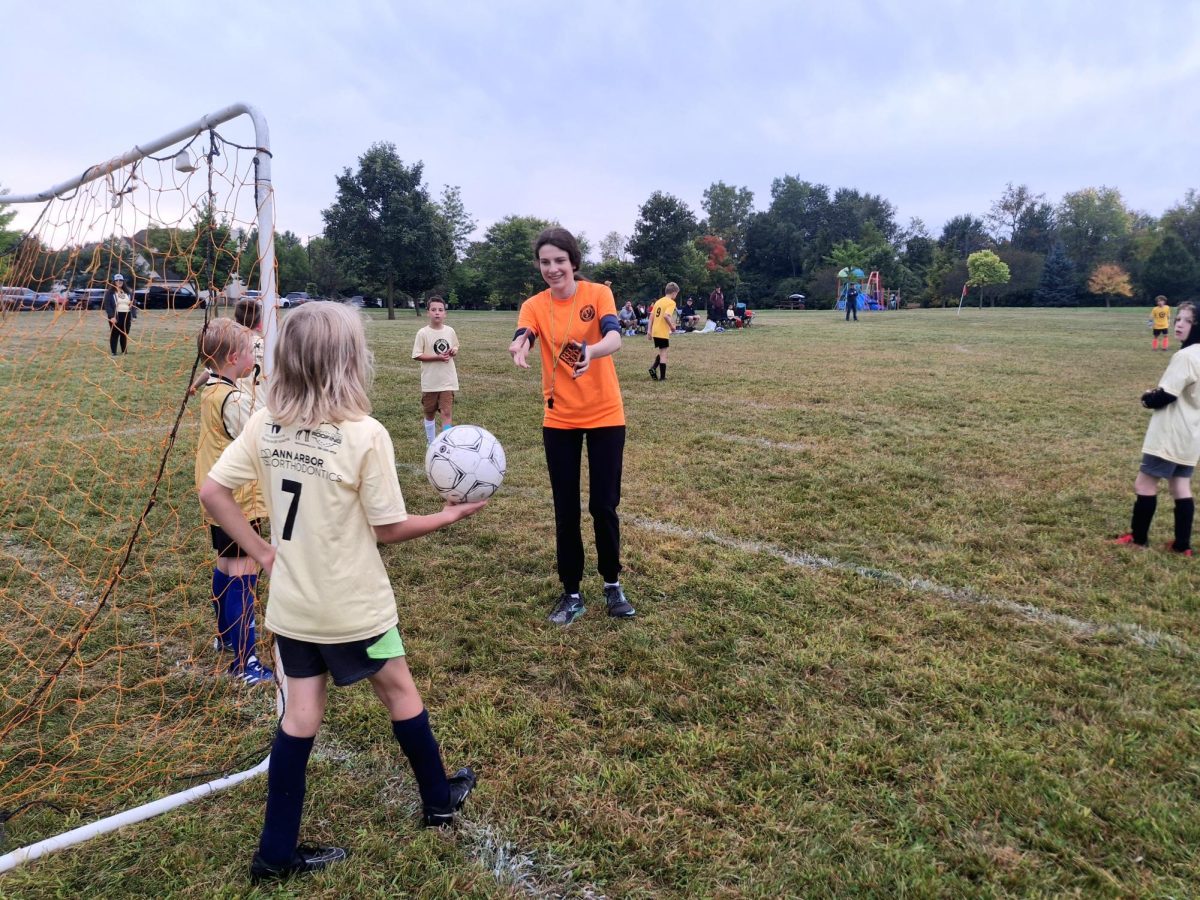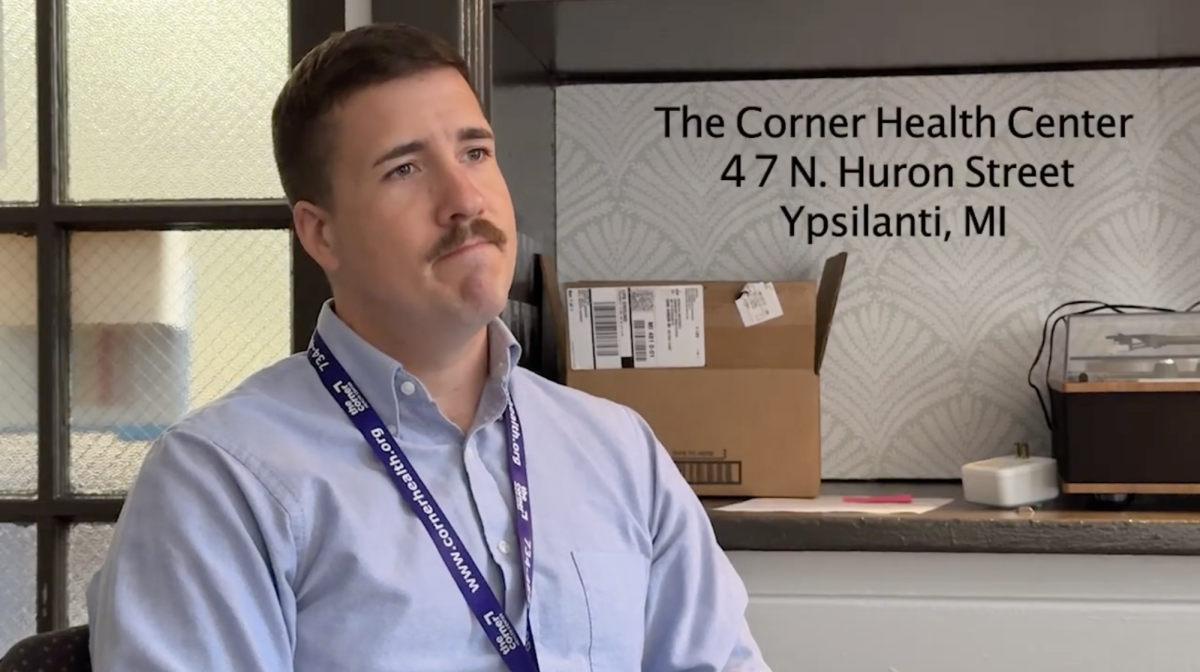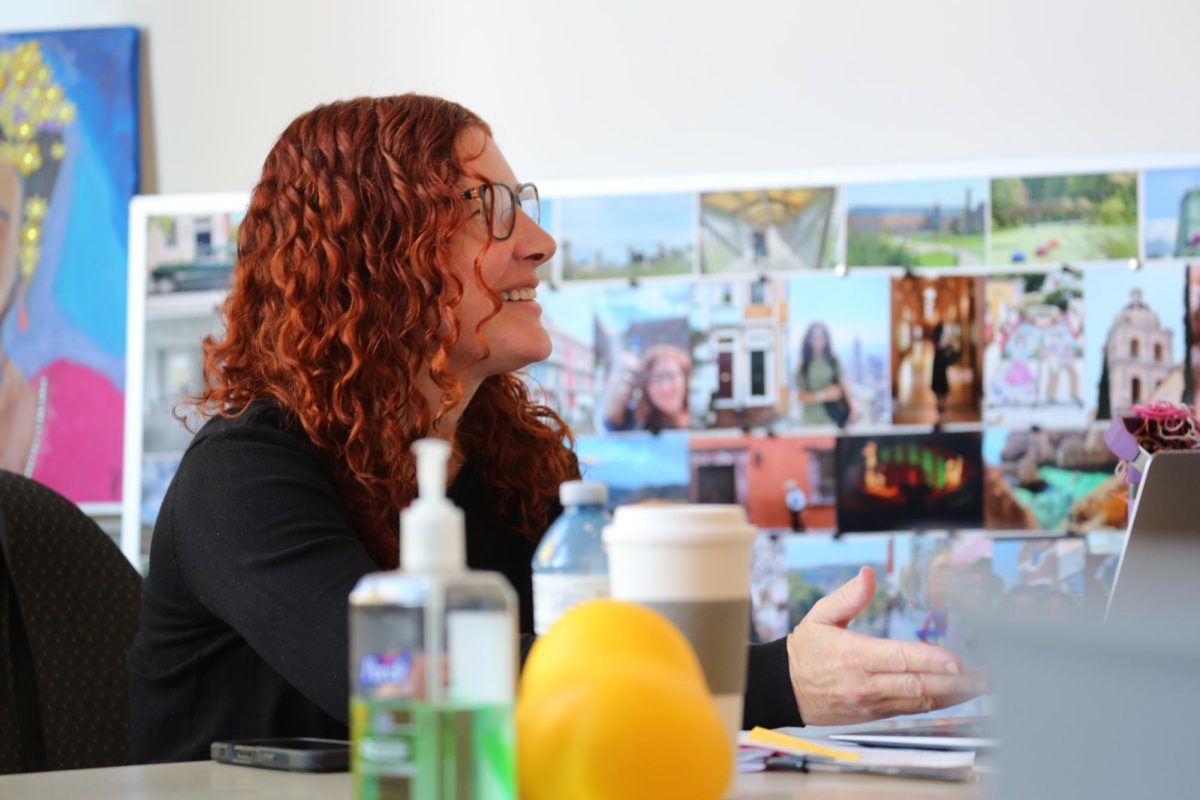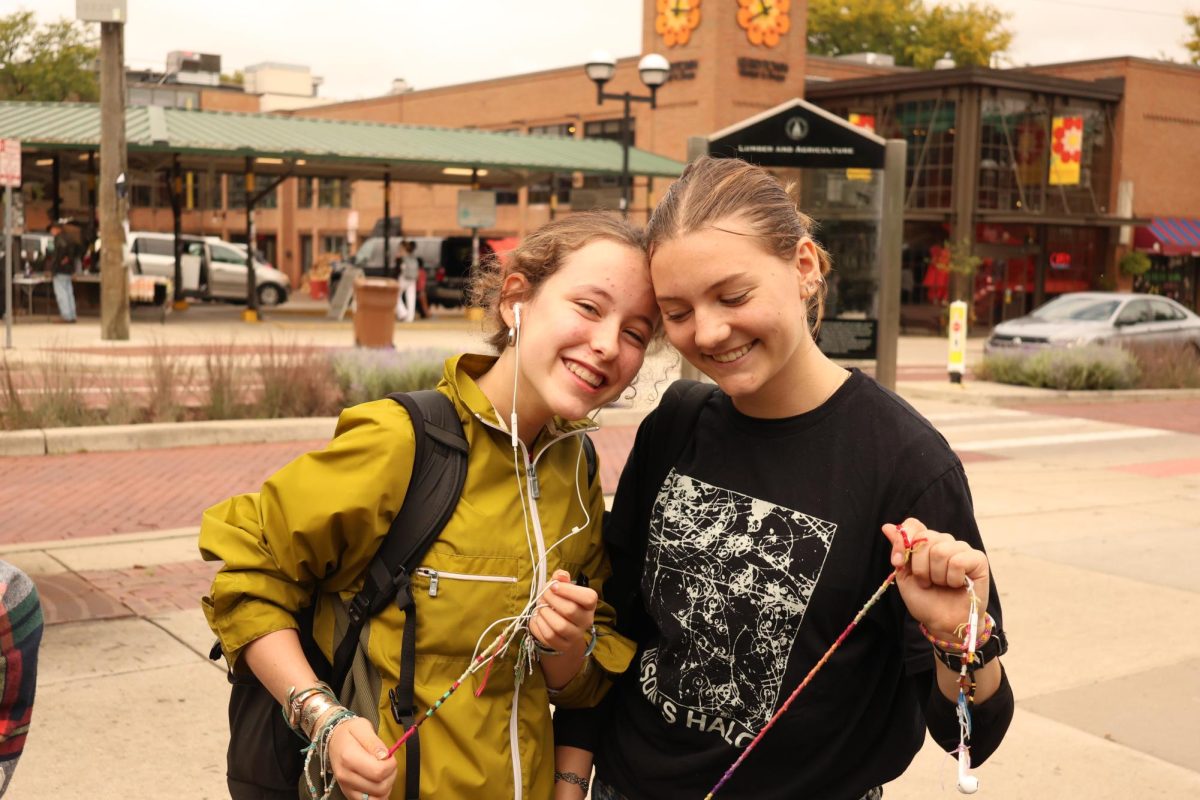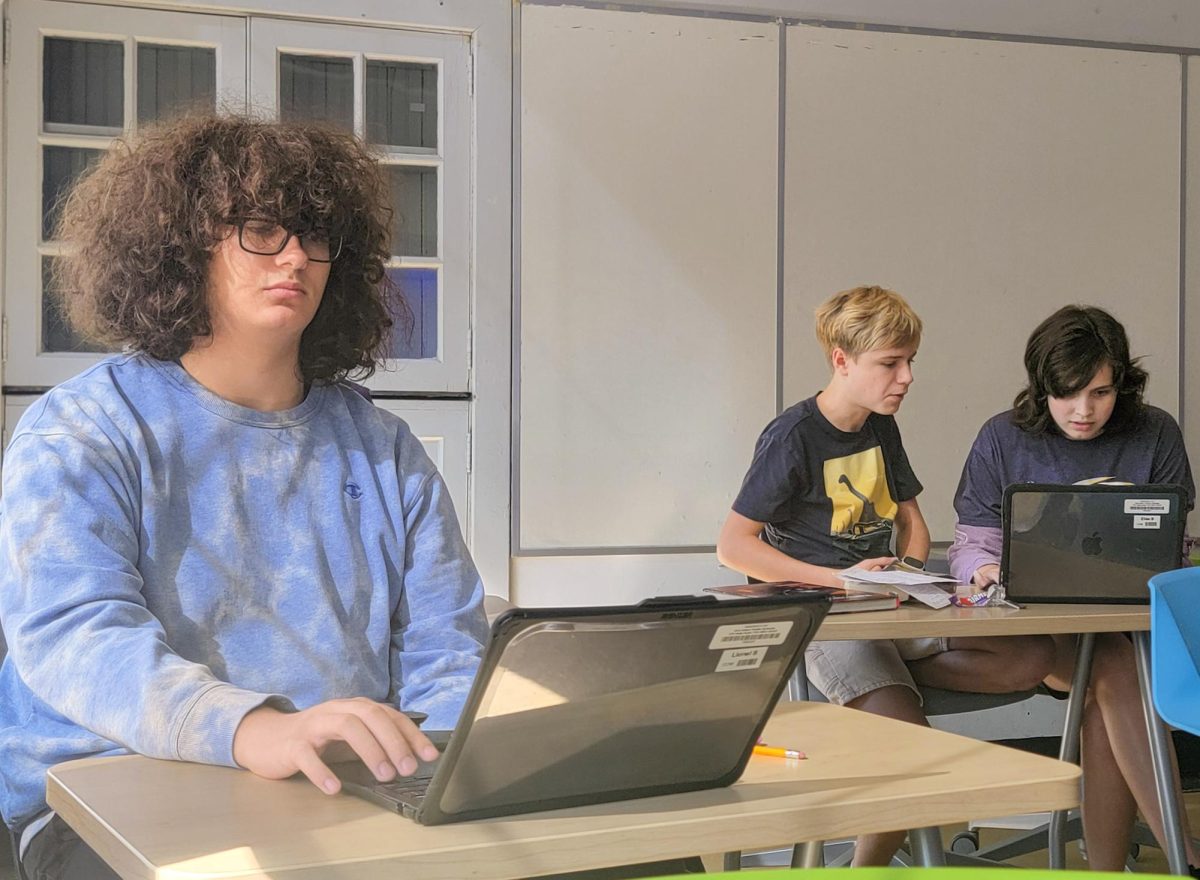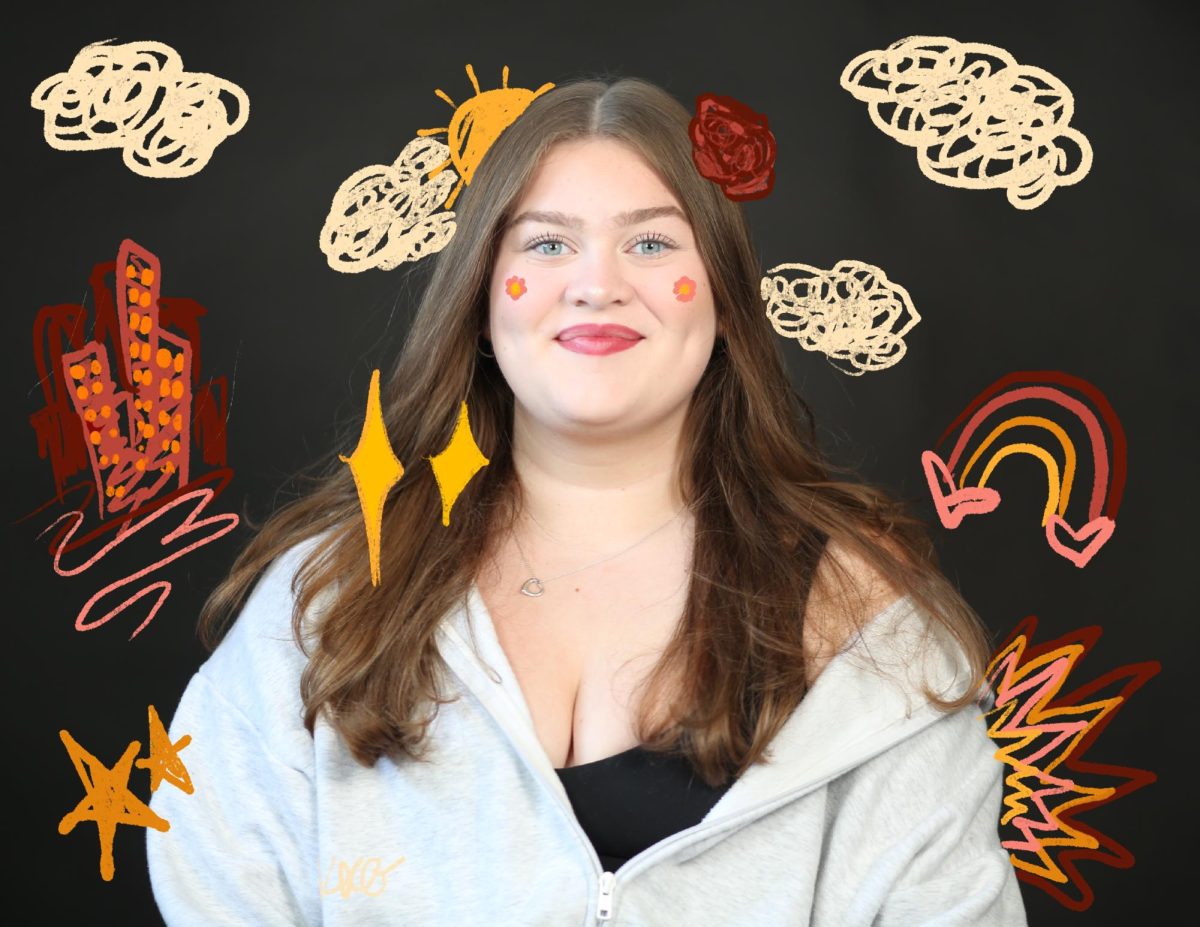Underneath twinkling, colorful Christmas lights one Friday night at the newly opened and brightly decorated Obama office in Kerrytown, Pioneer High School senior Rachel Tucker flipped opened her cell phone and prepared to make a call. She was ready to introduce herself as a volunteer for President Obama’s reelection campaign.
This wasn’t a routine call, however. Tucker only pretended that the phone was ringing, and the person on the other end of the line, fellow Pioneer senior Ola Kulaga, was seated just a few feet away, giggling as she answered the fake call. Kulaga and Tucker, two of the four leaders of Ann Arbor’s Team High School for Obama, were demonstrating a volunteer call for the benefit of the 12 other high schoolers seated in a circle of folding chairs that filled the small office.
The event was the Fall Kickoff Party for Team High School, and these Ann Arbor high school students gathered in the office that September night to socialize and munch on snacks, but primarily to learn about how to volunteer for Obama’s campaign through student-run Team High School. The fact that a volunteer team specifically for high school students exists demonstrates Ann Arbor teens’ willingness to get involved in the presidential campaigns, even if most of them won’t be able to vote this November. The 14 students present at the meeting were just a fraction of the over 85 students who have expressed interest in Team High School by joining the Facebook group.
“When students are there helping out, and have important ideas to add to the conversation, most people recognize how important it is to have the next generation involved,” said Community High School alumna Melanie Langa, the original coordinator of Team High School and now a student at Stanford University, in an email. “We’re the ones who are going to be making decisions very soon, and I think we should have a say in how we want things to turn out as early as possible.”
Langa, who began volunteering for Obama when the first Ann Arbor office opened in January 2012, was in charge of recruiting members for Team High School and organizing events in the spring. About 40 people came to Team High School volunteering events last spring, Langa said, 10 of them regulars.
The Obama campaign is generally organized into neighborhood teams, where volunteers work with people who live in the same area. Team High School, however, combines people of the same age group rather than the same geographical location.
“It’s a group of friends, so people might be more inclined to go,” said CHS senior Annabel Weiner, another of the four leaders that took over after Langa left for Stanford. “People want to go to events if their friends are going. It’s exciting.” The combination of social and political aspects was evident at the meeting. At one point, students toyed with the idea of having a sleepover in the office on the night of one of the debates.

The four current Team High School leaders—Tucker, Kulaga, Weiner, and Greenhills School senior Liz Baker—run the team with minimal supervision from adult campaign workers. Weiner said that they sometimes ask adult supervisors for advice, but usually are left to their own organizing. For the kickoff party, Tucker and Kulaga had to ask to use the office, but otherwise were allowed to plan the event on their own.
“They want whatever we want to do…so the more we want, the better it is for them,” Tucker said. Team High School isn’t funded by the campaign, so when it comes to things like ordering T-shirts, participants have to pay on their own.
Team High School’s volunteering events include phone banks, voter registration, canvassing, and data entries. Kulaga and Tucker are are especially experienced in organizing volunteers because both did an internship with the campaign this summer, which totaled about 20 hours a week. Tucker was an organizer for Chelsea and Kulaga for Dexter. The two were the only high schoolers in the program. They described it as a gratifying experience, but said they are ready for the more relaxed hours of running Team High School.
Kulaga estimated that being a leader of Team High School is about a four to six hours per week commitment. This includes the Team High School’s weekly phone bank, other volunteering events, and administratin of the Facebook group and other commmunication.
Tucker said she’s excited about the prospects for Team High School in the fall, due to an impressive showing of interest online.
“The Facebook group has exploded,” she said. “We added a bunch of people, but then I get requests almost every day to join it.”
The students who attended the kickoff meeting were committed to volunteering for Obama for a wide variety of reasons. At the beginning, Tucker asked everyone to go around the circle and share their “story,” or personal reason for supporting Obama. Students mentioned different issues that were important to them. Several brought up affordable higher education, which reflected the group’s composition: mostly high school seniors. Students also discussed health care, women’s rights, LGBT rights, foreign policy and the economy.
Volunteers agreed that their youth isn’t usually a disadvantage when it comes to working for the campaign. Tucker said that usually, people don’t know they’re talking to a high school volunteer, especially over the phone. Weiner said that although “there’s a low percentage of people who actually will answer or talk to you,” she doesn’t think this has anything to do with being a high schooler.
“I’ve gotten a lot of positive feedback, especially from the older volunteers, who are just really glad to see another wave of young Americans coming out and being politically active,” said CHS senior Julia Karr, who has participated in volunteering events for Team High School, the University of Michigan Democrats, and her neighborhood volunteering team. “I think it’s extremely important…to have this knowledge of what’s going on in your country and community from an early age, to make educated and informed decisions for the people who are ultimately going to run our country.”
Langa said that it can be frustrating in some situations when adults don’t give a lot of weight to the opinions of high schoolers, but she added that being a younger volunteer can be an advantage in many ways. People sometimes find it more difficult to turn down a younger person, she said. Also, Team High School’s younger demographic allows students to network within the high schools and give information about volunteering and voting to students who may not have known otherwise.
“I think it also made people more comfortable committing to events knowing that they were organized specifically for high school students, or that there would be other young people attending,” Langa said.
Volunteering has also allowed students to build organizational and people skills. Students sometimes find themselves in awkward or even comic situations. Weiner has had several of her teachers on a list of people to call at phone banks, and was once even assigned to call the mayor of Ann Arbor.
Volunteers also often have to experience rejection while canvassing or making calls.
“I’ve learned about getting refused a lot,” said Weiner. ‘I’ve learned how to try to talk to people who I don’t know on the phone and get them them to talk to me.”
Karr recalled that once, while canvassing, she knocked at a door and saw a dog come up on the other side of the screen and bark “hysterically.” Karr expected the dog’s owner to call it off, but instead the women began yelling at her.
“She goes, ‘What are you doing? Can’t you tell we don’t want you here? Don’t even try,’” said Karr.
However, Karr said that’s the only really negative reaction she’s gotten. People tend to be friendly, and some have even offered her water. The positive feedback she gets helps her feel that she’s making a difference, she said.
Weiner also said she feels that her actions are making an impact.
“Every person you talk to counts, even if you just talk to two people on one night it helps, even if you just register one voter, then that’s one more person who will vote,” Weiner said.
Kulaga said that volunteering helped her feel a part of a larger effort.
“You really feel like it’s bigger than yourself because you’re some high school student and the only thing you do is like homework assignments and sure, that’s a big deal to you, and whatever, if you’re good at it that’s great,” she said. “But when you change somebody’s mind about voting, you’re like, ‘Wow, I just helped elect a president.’ It’s really amazing.”



